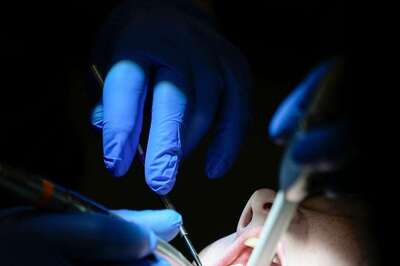
views
While for most people sex can be euphoric, for others it is agonizing. Dyspareunia is a condition where one feels extreme pain during or after sexual intercourse. While some discomfort is normal and to be expected if you have recently become sexually active, it should pass in time. Pain during sex, contrary to what popular fiction suggests, is not normal and one should consult a medical professional if they experience it.
What are the symptoms of dyspareunia?
Usually, a woman with dyspareunia complains of pain at the entrance of the vagina which increases during penetration or thrusting of the penis. Some women may also complain of extreme tightness around the vagina, which makes sexual intercourse more painful.
What are the causes of dyspareunia?
There can be multiple reasons behind dyspareunia but most of them are treatable. Following are some of the causes:
- Any injury to the vulva or vagina during childbirth
- Having sexual intercourse shortly after childbirth
- Yeast or fungal infections in the vagina
- Fibroids in the uterus
- Endometriosis (a painful condition where the tissue that lines the inside of the uterus grows outside the uterus)
- Ovarian cysts
- Sexually transmitted disease such as herpes or genital warts
- Vaginismus (vaginal muscles spasms that lead to tightness)
- Pelvic inflammatory disease (an infection that causes inflammation)
- Ectopic pregnancy (fetus gets planted outside the uterus)
- Vaginal atrophy (dryness and stiffness) after menopause
- Psychological trauma
Dyspareunia is very rarely seen in men. However, the possible causes of dyspareunia in men can be:
- Infections such as thrush
- Sexually transmitted infections such as genital herpes and chlamydia
- Tightness or tear in the foreskin of the penis
- Inflammation of the prostate gland
What is the treatment for dyspareunia?
The cause of the disease determines the treatment of dyspareunia. In the case of vaginal dryness, the doctor may recommend the use of water-based lubricants during intercourse. The doctor may also ask you to stimulate the clitoris before sexual intercourse to avoid friction.
The doctors would prescribe you an antifungal medication in case of a fungal or yeast infection, antiviral drugs for a sexually transmitted disease and topical steroid creams for lichen planus and lichen sclerosis.
Hormone replacement therapy with estrogen and progesterone could be given to the patients with vaginal atrophy post-menopause. The therapy involves the use of creams, ointments, and oral pills.
Surgical treatments could be required for women with endometriosis and uterine fibroids.
Can you prevent dyspareunia?
There are some causes of dyspareunia such as trauma and injury during childbirth, which cannot be prevented. But you can take the following measures to prevent dyspareunia to an extent:
- Do not wear tight clothes and wear cotton underwear so that your skin gets to breathe. Change your clothes immediately after a swim or a workout session.
- Urinate and wipe your vagina properly after sexual intercourse.
- Practice safe sex to avoid getting sexually transmitted diseases.
- Use water-based lubricants to prevent vaginal dryness.
- After childbirth, wait for at least six weeks before having sex.
For more information, read our article on Pain during sex.
Health articles on News18 are written by myUpchar.com, India’s first and biggest resource for verified medical information. At myUpchar, researchers and journalists work with doctors to bring you information on all things health.


















Comments
0 comment